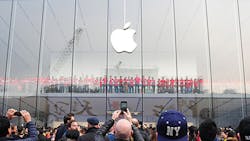Retail Road Rockier for Apple After India Sticks to Local Rules
India’s finance minister has ratified a decision that Apple Inc. must meet local sourcing rules to open its own stores, according to people familiar with the matter, dealing what could be a fatal blow to the iPhone maker’s effort to open retail outlets in the country.
Minister Arun Jaitley decided to support the decision by India’s Foreign Investment Promotion Board that Apple will have to procure 30% of components locally if it wants to sell through its own retail stores, said the people, asking not to be identified because the matter is private. The company makes most of its products in China and doesn’t currently meet that criteria.
Apple CEO Tim Cook went to India last week for the first time as he seeks to capitalize on the market’s prospects and revive his company’s growth. India has become the world’s fastest-growing smartphone market, with a billion devices forecast to be sold over the next five years. Apple has little market share in the country now, as consumers opt for less expensive devices from rivals such as Samsung Electronics Co. and Micromax Informatics Ltd.
“The government’s decision will have a pretty profound effect on Apple,” said Neil Shah, research director at Counterpoint Research. “The company typically likes to control every piece of the iPhone value chain right from sourcing components to the point of sale. Having complete control has been key to its strategy.”
India seeks to encourage companies to make products in the country as part of its industrial policy, aimed at reaping the benefits that come from manufacturing facilities and jobs. It doesn’t want technology companies to sell products and take advantage of its vast consumer base without making their own capital investments.
The finance minister’s decision could still be overturned, but that could require intervention from Prime Minister Narendra Modi.
India can provide waivers to the manufacturing rules for cutting-edge technology companies. But the FIPB decided it can’t certify Apple for that exception, people familiar with the matter said. Apple currently sells its iPhones and iPads through franchisees as well as at the retail units of India’s biggest conglomerates Tata Group and Reliance Industries Ltd.
Finance Ministry spokesman D.S. Malik couldn’t immediately be reached for comment. An Apple India spokesman declined to comment.
Apple has used its airy, glass-encased stores from New York’s Fifth Avenue to Tokyo’s Ginza to draw sales around the world. In price-conscious India, most phones are bought at small, congested street-corner shops and carriers typically don’t subsidize handsets through calling plans.
“Apple has to continue retailing in India through a variety of avenues like premium resellers, online retailers and multi-brand stores,” said Shah. “The multi-brand stores, for example, can steer customers away from costly iPhones to less expensive but high-margin brands.”
Cook has compared India to China a decade ago in its growth potential. While Apple only ships about 2% of the phones in the country, iPhone sales surged 56% in the March quarter.
Apple has been competing more aggressively in the country by increasing advertising and expanding distribution through retail partners. All this helped grow its revenue to $1 billion last year, the Times of India reported, citing company filings.
Still, Apple’s devices are priced far beyond the reach of average citizens. More than 80% of phones sold in the country cost less than $150 while the cheapest new iPhone from Apple is the 4-inch iPhone SE at 39,000 rupees ($579). The company’s push to bring in and sell lower-priced refurbished iPhones was rejected after competitors objected, a telecommunications ministry official said earlier this month.
By Siddhartha Singh and Saritha Rai
About the Author
Bloomberg
Licensed content from Bloomberg, copyright 2016.
